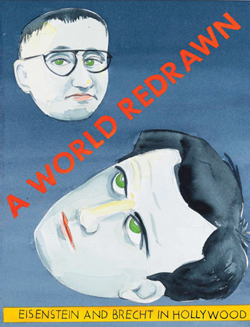Description
Zoe Beloff's book A World Redrawn is part of a larger exhibition of archival objects, films, architectural models and drawings (first displayed at the CUNY James Gallery in 2015), which takes up the tantalizing prospect of Sergei Eisenstein and Bertolt Brecht living and working in the seat of American consumerist spectacle. Arriving in Hollywood independently for periods in the 1930s and 40s, Eisenstein and Brecht worked on screenplays and treatments for studio films that were never developed, leaving behind notes and fragments for unrealized projects that Beloff uses as points of departure for her own creative and critical engagement.
In imagining what form these films might have taken, Beloff considers herself a collaborator and comrade of these historic figures, and seeks to activate the past in order to bring to light the "latent potential" otherwise entombed in historic record. The impact of psychoanalysis, mass entertainment, and the social role of cinema are just some of the topics Beloff extrapolates from the volatile period between the 1920s and 40s that has long informed her own interests and research, and especially A World Redrawn. As in other projects, such as DREAMLAND: The Coney Island Amateur Psychoanalytic Society and their Circle, and rehearsals of Brecht's play The Days of the Commune in public spaces (including Zuccotti Park during Occupy Wall Street), Beloff extends Eisenstein and Brecht's political and artistic positions into a contemporary realm, demonstrating that "...the ghosts of the past are not dead, and as they walk among us they have very real effects."
A recent review of A World Redrawn in Film Comment magazine admires how "...Beloff does justice to ambitious, inchoate political art by highlighting its equally playful and intellectual sensibilities, all the while emphasizing its uncanny ability to speak across time to our current troubling realities." Alongside a short film based on Bertolt Brecht's unrealized film A Model Family, Beloff's Glass House is a vertically-oriented science fiction narrative about an all-glass skyscraper, which reflects on architecture as a representation of social and economic relations--a metaphor readily adapted to our own age of surveillance and spectacle. Beloff's fascinating book includes previously unpublished drawings by Eisenstein and two scholarly essays commissioned for the project. Esther Leslie contemplates the radical potential of laughter, and Hanna Frank discusses surprising affinities between Soviet and American animation.
Published by Christine Burgin and distributed by Artbook / D.A.P
